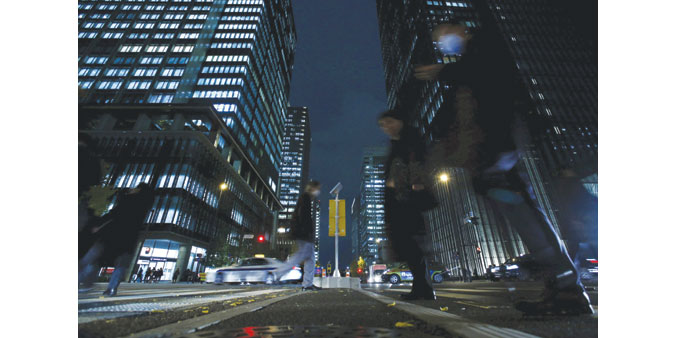Pedestrians cross a street at a business district in Tokyo. Japanese business confidence held steady and companies maintained their bullish spending plans, a quarterly central bank survey showed yesterday, offering some relief to policymakers worried that global headwinds could upset a fragile economic recovery.
Reuters
Tokyo
Japanese business confidence held steady and companies maintained their bullish spending plans, a quarterly central bank survey showed yesterday, offering some relief to policymakers worried that global headwinds could upset a fragile economic recovery.
But despite favourable investment plans, companies were gloomy about conditions three months ahead as sluggish emerging market demand weighs on exports, the Bank of Japan’s “tankan” survey found, casting some doubt on whether firms would in fact boost their spending by as much as planned.
“Declines in oil prices and upbeat capital spending plans are among a few positive factors. Other than that there seems to be little in the way of bright spots in this data,” said Hideo Kumano, chief economist at Dai-ichi Life Research Institute.
The headline index gauging big manufacturers’ sentiment was unchanged from three months ago at plus 12, the tankan showed, contrary to market expectations of a slight deterioration.
Big non-manufacturers’ sentiment was also steady at a 24-year high of plus 25, as hotels and retailers benefited from a surge in overseas tourists shopping for goods made cheap by a weak yen.
Despite overseas headwinds, big companies expect to increase capital expenditure by 10.8% in the current fiscal year, the survey found, largely unchanged from the previous survey and roughly in line with market forecasts.
The data adds to growing signs companies will finally direct some of their record profits to wages and capital expenditure, which are key to the success of Premier Shinzo Abe’s stimulus policies aimed at ending nearly two decades of economic stagnation.
The data also heightens the chance the BoJ will hold off on expanding its massive stimulus programme when it meets for a two-day rate review ending on Friday, analysts say.
The survey highlighted concerns many firms had on the economic outlook, with current strong profits driven more by temporary windfalls such as the weak yen and low oil costs, rather than growing real demand.
Both big manufacturers and non-manufacturers expect business conditions to worsen in the coming three months, the survey showed, highlighting fears that China’s slowdown and the moderating pace of the yen’s decline could hurt exports.
Many firms also expect profit margins to shrink, complaining of a supply glut at home and abroad, keeping policymakers under pressure to reignite flagging growth. “Deterioration in firms’ outlook is the focus of today’s data,” said Junko Nishioka, chief economist at Sumitomo Mitsui Banking.
“The economy lacks recovery momentum,” she said, noting the weak outlook would keep alive market expectations of further BoJ easing.
Japan narrowly dodged recession in the third quarter as capital expenditure rose more than initially expected, but analysts expect any rebound in growth to be modest.
The BoJ has said it will stand pat unless a severe slowdown in emerging markets hurts corporate profits, and in so doing discourages big businesses from raising wages and capital expenditure.
The government plans to compile a supplementary budget of around ¥3.5tn ($28.7bn), which will modestly boost growth but not until around April, analysts say.

